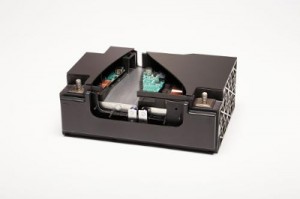 Johnson Controls is expanding its automotive battery offerings by introducing a Lithium Titanate battery. The company’s latest 12-volt technology, which is a collaboration with Toshiba, will power Advanced Start-Stop vehicles.
Johnson Controls is expanding its automotive battery offerings by introducing a Lithium Titanate battery. The company’s latest 12-volt technology, which is a collaboration with Toshiba, will power Advanced Start-Stop vehicles.
“Johnson Controls is pursuing opportunities to develop evolutionary low-voltage energy storage systems that will help our customers meet increasing fuel regulations at a lower cost than a hybrid or electric vehicle,” said Lisa Bahash, group vice president and general manager Original Equipment, Johnson Controls Power Solutions. “In partnership with Toshiba, we are expanding our Lithium-ion product offerings to support the needs of our global customers.”
The Lithium Titanate chemistry is effective at quickly recharging, works well in a wide range of temperatures and can be easily integrated into a vehicle’s 12-volt electrical system. Toshiba, with its SCiB technology, is the established market leader for Lithium Titanate.
“Toshiba is pleased to work with Johnson Controls to supply SCiB™ cells for this application,” said Shun Egusa, general manager of Toshiba’s automotive business. “The opportunity to support global automakers with their goal of improving vehicle efficiency is an important part of our strategy and vision.”
An Advanced Start-Stop system has two batteries. A 12-volt Absorbent Glass Mat (AGM) or Enhanced Flooded Battery (EFB), which will start the engine and supply power to accessories such as lights, navigation systems and radios. The 12-volt Lithium Titanate battery will primarily accept and store regenerative braking energy during vehicle deceleration, enabling greater power and load management capabilities.
“With an Advanced Start-Stop system, drivers could save up to 8 percent every time they fill up their gas tank as the batteries enable the engine to shut off more frequently and for longer periods of time,” said Bahash. “This is also a great solution for our customers because the technology allows for greater fuel savings without major changes to the existing powertrain and electrical systems.”







